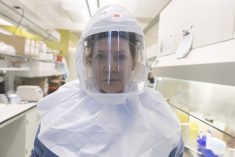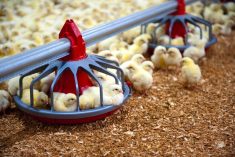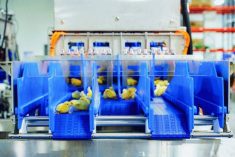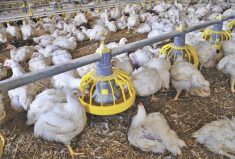Chicken is one of the most widely consumed meats worldwide and poultry farming is a thriving industry. But raising chickens for meat contributes to climate change, mainly as a result of increased nitrogen excretion and ammonia emissions.
Nitrogen emissions can be reduced by feeding a low protein diet, but this can negatively affect the growth of broiler chicks. Studies have shown that to ensure that there is no loss of growth performance, low protein diets can be supplemented with amino acids, the building blocks of proteins. However, how such supplementation alleviates the negative effects of a low protein diet is not clearly understood.
In a recent study, researchers at Kobe University in Japan examined the mechanisms underlying the impact of amino acid supplementation on broiler chickens that were fed a low protein diet.
Read Also

GenOvis awards presented at Ontario Sheep Farmers’ annual meeting
Producers and youth were recognized for their contributions during the Ontario Sheep Farmers’ annual GenOvis and leadership awards.
First, they fed three groups of broiler chicks with different types of food — a standard recommended diet, a low protein diet with 15 per cent reduced protein content, and a low protein diet supplemented with amino acids. They monitored feed intake and weight gain until the chicks were 35 days old.
Chicks fed a low protein diet showed a significant decrease in body weight as well as breast and leg muscle weight, compared to those on a standard diet. However, none of these effects were observed in chicks fed a low protein diet supplemented with amino acids, indicating that amino acid supplementation mitigated the negative effects.
To explore further, they looked at various genes involved in muscle synthesis and degradation. Real-time polymerase chain reaction analyses — a technique that detects the amplification of DNA molecules in real time — were used to examine the extent to which these genes were expressed in different muscles.
Results showed the impact of the low protein diet was different in the breast muscle (pectoralis major) and the leg muscle (biceps femoris).
Breast muscle of chicks on a low protein diet was found to have an increased expression of the gene LC3B. However, in the leg muscle there was increased expression of the genes atrogin-1, MuRF-1 and MyoD. While different muscle groups showed distinct gene expression patterns, all the identified genes are involved in protein degradation, suggesting that a low protein diet induces proteolysis in muscles.
No differences were found in gene expression between chicks fed a standard diet and those fed the amino acid supplemented low protein diet.
These results provide an explanation for the reduced growth performance with the low protein diet and also indicate that amino acid supplementation alleviates these effects differently in different muscle groups.
These findings have major implications for the poultry industry. Lead researcher Dr. Kazuhisa Honda said “our results will contribute to the development of LP feed for broiler chickens, which is still a major challenge in developing countries.”
By doing so, it opens doors for the increased use of low protein feed, which means lower animal production costs in the future. These findings also address concerns around climate change and the environmental impacts on the poultry industry.














